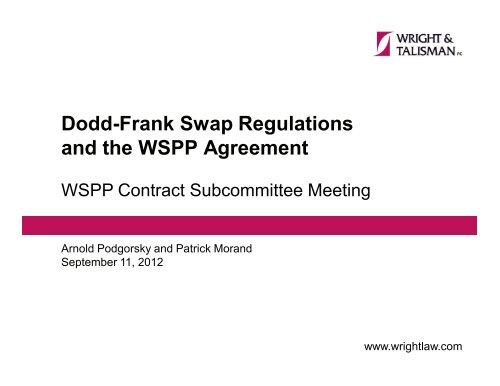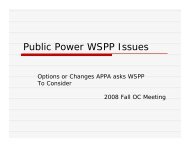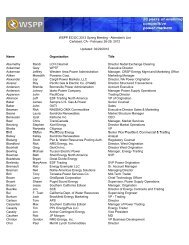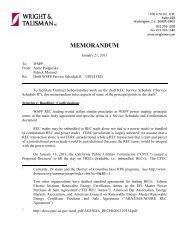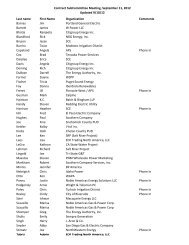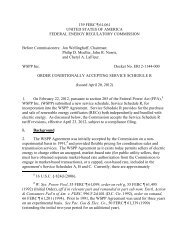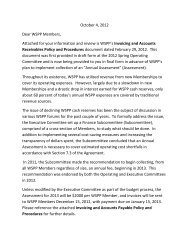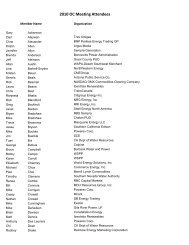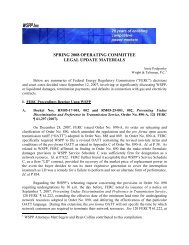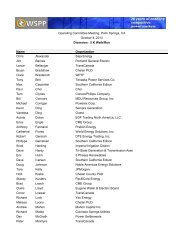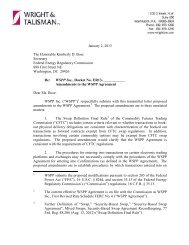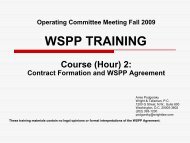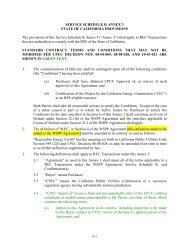WSPP Dodd-Frank Presentation
WSPP Dodd-Frank Presentation
WSPP Dodd-Frank Presentation
You also want an ePaper? Increase the reach of your titles
YUMPU automatically turns print PDFs into web optimized ePapers that Google loves.
<strong>Dodd</strong>-<strong>Frank</strong> Swap Regulations<br />
and the <strong>WSPP</strong> Agreement<br />
<strong>WSPP</strong> Contract Subcommittee Meeting<br />
Arnold Podgorsky and Patrick Morand<br />
September 11, 2012<br />
www.wrightlaw.com
Overview of the Swap Regulations<br />
• CFTC issued several rules interpreting how it will<br />
implement <strong>Dodd</strong>-<strong>Frank</strong> swap regulation:<br />
– Swap Definition Final Rule<br />
– Commodity Options Final and Interim Final Rules<br />
– End-User Exception Final Rule<br />
• The following is our summary of what those<br />
rules provide<br />
© Wright & Talisman, P.C. All rights reserved. www.wrightlaw.com 2
Overview of the Swap Regulations<br />
• <strong>Dodd</strong>-<strong>Frank</strong> says if your transaction is a swap<br />
transaction, then:<br />
– it must be executed on a designated contract market<br />
(“DCM”) or a swap execution facility (“SEF”)<br />
– it must be cleared through a derivatives clearing<br />
organization (“DCO”)<br />
• Note: for simplicity, we’ll refer to DCMs, SEFs, and DCOs<br />
collectively as “exchanges”<br />
– and it must be reported to a swap data repository or<br />
to the CTFC itself<br />
• Unless an exclusion, exemption, or exception<br />
applies…<br />
© Wright & Talisman, P.C. All rights reserved. www.wrightlaw.com 3
Overview of the Swap Regulations<br />
(cont.)<br />
Best<br />
OK<br />
Eh<br />
No<br />
Bueno<br />
Forward Contract<br />
Exclusion<br />
Trade Option<br />
Exemption<br />
End-User<br />
Exception<br />
No applicable<br />
exclusion, exemption,<br />
or exception<br />
•No regulatory requirements<br />
(CFTC retains its anti-manipulation jurisdiction<br />
in all cases)<br />
•Recordkeeping requirements apply (less<br />
stringent for non-SD & MSP)<br />
•Possible reporting requirements depending<br />
on whether either counterparty has any nontrade<br />
option activity during the year<br />
•No need to execute and clear the transaction<br />
on an exchange, but…<br />
•Reporting requirements apply to one of the<br />
counterparties<br />
•Full swap regulations apply:<br />
•execute and clear on an exchange<br />
•reporting requirements apply<br />
© Wright & Talisman, P.C. All rights reserved.<br />
www.wrightlaw.com 4
Overview of the Swap Regulations<br />
(cont.)<br />
• Forward Contract Exclusion<br />
– An exclusion from the definition of swap for:<br />
• any sale of a nonfinancial commodity<br />
• for deferred shipment or delivery<br />
• that is intended to be physically settled<br />
– Nonfinancial commodities include capacity and<br />
energy products, as well as RECs and emissions<br />
© Wright & Talisman, P.C. All rights reserved. www.wrightlaw.com 5
Overview of the Swap Regulations<br />
(cont.)<br />
• Forward Contract with Embedded Option<br />
1. may be used to adjust the forward contract price;<br />
may not undermine the overall nature of the contract<br />
as a forward contract<br />
2. does not target the delivery term, so that the<br />
predominant feature of the contract is actual<br />
delivery; and<br />
3. cannot be severed and marketed separately from<br />
the overall forward contract in which it is embedded
Overview of the Swap Regulations<br />
(cont.)<br />
• Forward Contract with Embedded Volumetric Optionality<br />
1. does not undermine the overall nature of the contract as a<br />
forward contract<br />
2. the predominant feature of the contract is actual delivery<br />
3. cannot be severed and marketed separately from the overall<br />
contract in which it is embedded<br />
4. the seller intends to deliver if the optionality is exercised<br />
5. the buyer intends to take delivery if it exercises the embedded<br />
volumetric optionality<br />
6. both parties are commercial parties<br />
7. the exercise or non-exercise of the embedded volumetric<br />
optionality is based primarily on physical factors, or regulatory<br />
requirements, that are outside the control of the parties and are<br />
influencing demand for, or supply of, the nonfinancial<br />
commodity.
Overview of the Swap Regulations<br />
(cont.)<br />
• Trade Option Exemption<br />
– CFTC says all commodity options are swaps, but<br />
some (trade options) are exempt where:<br />
1. the seller is either an eligible contract participant (generally<br />
a financial house) or a producer, processor, commercial<br />
user, etc. of the commodity and is entering into the<br />
transaction solely for purposes related to its business<br />
2. the buyer of the commodity option is producer, processor,<br />
commercial user, etc. of the commodity and is entering into<br />
the transaction solely for purposes related to its business<br />
3. both parties intend that the commodity option be physically<br />
settled, so that, if exercised, the option would result in<br />
delivery
Overview of the Swap Regulations<br />
(cont.)<br />
• End-User Exception<br />
– CFTC says the clearing requirement for swaps will<br />
not apply where one of the counterparties to the<br />
swap:<br />
1. is not a financial entity<br />
2. is using the swap to hedge or mitigate<br />
commercial risk<br />
3. notifies CFTC how it generally meets its financial<br />
obligations associated with entering into the noncleared<br />
swaps
<strong>WSPP</strong> Agreement Transaction As<br />
Forward Contract<br />
• The <strong>WSPP</strong> Agreement provides generally for<br />
forward contract transactions<br />
• The <strong>WSPP</strong> Agreement provides for transactions:<br />
– in nonfinancial commodities (energy, capacity, and<br />
RECs)<br />
– that are intended to be physically settled
<strong>WSPP</strong> Agreement Transaction As<br />
Forward Contract<br />
• CFTC says “book-outs” are within the forward<br />
contract exclusion where:<br />
– where two counterparties have multiple, offsetting<br />
positions with each other, and rather than requiring<br />
the effectuation of redundant deliveries and the<br />
assumption of risks attendant thereto, the two<br />
counterparties may, but are not obligated to,<br />
terminate their contracts and forego the deliveries and<br />
instead negotiate payment-of-differences pursuant to<br />
a separate cancellation agreement referred to as a<br />
book-out<br />
© Wright & Talisman, P.C. All rights reserved. www.wrightlaw.com 11
<strong>WSPP</strong> Agreement Transaction As<br />
Forward Contract<br />
• The <strong>WSPP</strong> Agreement provides two definitions<br />
of “Bookout” as follows:<br />
– a transaction where prior to the time performance is<br />
to commence under a Confirmation, the Parties enter<br />
into a second (substitute) transaction for the purpose<br />
of fulfilling their respective obligations under that<br />
Confirmation by offset rather than physical delivery<br />
– a transaction where after non-performance under a<br />
Confirmation, the Parties enter into a second<br />
(substitute) transaction for the purpose of finally<br />
settling losses incurred by the Performing Party due<br />
to non-performance of such Confirmation.<br />
© Wright & Talisman, P.C. All rights reserved. www.wrightlaw.com 12
<strong>WSPP</strong> Agreement Transaction As<br />
Forward Contract<br />
• The first <strong>WSPP</strong> definition seems to conform to the CFTC<br />
standard, although it does not appear in any of the<br />
substantive provisions of the <strong>WSPP</strong> Agreement<br />
– Discussion Point: Should this definition be retained?<br />
Should it be referenced in other substantive<br />
provisions?<br />
• The second definition seems to be describing something<br />
very different from the CFTC standard<br />
– Discussion Point: Should this definition be retained?<br />
Should it be called something else?<br />
© Wright & Talisman, P.C. All rights reserved. www.wrightlaw.com 13
<strong>WSPP</strong> Agreement Transaction As<br />
Forward Contract<br />
• CFTC says “netting” is within the forward<br />
contract exclusion:<br />
– this refers to physical netting between two<br />
counterparties at a common delivery point<br />
• The <strong>WSPP</strong> Agreement refers to “Netting” in the<br />
context of netting of payments<br />
– Discussion Point: Should the <strong>WSPP</strong> Agreement<br />
expressly provide for physical netting?<br />
© Wright & Talisman, P.C. All rights reserved. www.wrightlaw.com 14
<strong>WSPP</strong> Agreement Transaction As<br />
Forward Contract<br />
• CFTC also addresses contract provisions for<br />
force majeure, termination for default, and<br />
liquidated damages<br />
• The corresponding <strong>WSPP</strong> Agreement provisions<br />
seem consistent with these standards<br />
• Discussion Point: does anyone see otherwise?<br />
© Wright & Talisman, P.C. All rights reserved. www.wrightlaw.com 15
<strong>WSPP</strong> Agreement Transaction As Forward<br />
Contract With Embedded Option<br />
• The <strong>WSPP</strong> Agreement provides that the price<br />
for a transaction may be a “floating price” based<br />
on an index, etc.<br />
• This provision seems consistent with the forward<br />
contract with embedded option standard<br />
• Discussion Point: does anyone see otherwise?<br />
© Wright & Talisman, P.C. All rights reserved. www.wrightlaw.com 16
<strong>WSPP</strong> Agreement Transaction As Forward<br />
Contract With Embedded Volumetric Optionality<br />
• Assuming the first six elements are satisfied, how do<br />
transactions under the <strong>WSPP</strong> Service Schedules satisfy<br />
the seventh element?<br />
7. the exercise or non-exercise of the embedded volumetric<br />
optionality is based primarily on physical factors, or regulatory<br />
requirements, that are outside the control of the parties and are<br />
influencing demand for, or supply of, the nonfinancial<br />
commodity.<br />
© Wright & Talisman, P.C. All rights reserved. www.wrightlaw.com 17
<strong>WSPP</strong> Agreement Transaction As Forward<br />
Contract With Embedded Volumetric Optionality<br />
• Service Schedule A<br />
– energy is sold only to the extent seller determines to<br />
deliver or buyer agrees to take delivery<br />
– the factors influencing these decisions could be<br />
physical or regulatory, but they also could be purely<br />
economic<br />
– Discussion Point: is this optionality consistent with the<br />
forward contract exclusion?<br />
© Wright & Talisman, P.C. All rights reserved. www.wrightlaw.com 18
<strong>WSPP</strong> Agreement Transaction As Forward<br />
Contract With Embedded Volumetric Optionality<br />
• Service Schedule B<br />
– the factors for curtailing the delivery amount mostly<br />
seem consistent with the forward contract exclusion<br />
(e.g., physical = output is reduced, emergency, etc.<br />
and regulatory = need to meet public utility<br />
obligations)<br />
– Discussion Point: but do the recall provisions create<br />
an optionality that is inconsistent with the forward<br />
contract exclusion?<br />
© Wright & Talisman, P.C. All rights reserved. www.wrightlaw.com 19
<strong>WSPP</strong> Agreement Transaction As Forward<br />
Contract With Embedded Volumetric Optionality<br />
• Service Schedule C<br />
– this seems the most straightforward with no<br />
optionality<br />
– Discussion Point: but does the demand right create<br />
an optionality that is inconsistent with the forward<br />
contract exclusion?<br />
© Wright & Talisman, P.C. All rights reserved. www.wrightlaw.com 20
<strong>WSPP</strong> Agreement Transaction As Forward<br />
Contract With Embedded Volumetric Optionality<br />
• RECs<br />
– Resource Contingent RECs and Resource Contingent<br />
Bundled RECs seem to satisfy all seven elements<br />
• Discussion Point: but does permitting the parties to agree to<br />
other circumstances for non-delivery make the optionality<br />
problematic?<br />
– Discussion Point: do Facility As-Run RECs and<br />
Facility As-Run Bundled RECs present the same<br />
issues of element 7 as the other Service Schedules?<br />
© Wright & Talisman, P.C. All rights reserved. www.wrightlaw.com 21
<strong>WSPP</strong> Agreement Option Transactions<br />
• The definition of Physically-Settled Options<br />
under the <strong>WSPP</strong> Agreement seem to satisfy the<br />
trade option exemption<br />
• Discussion Point: do any adjustments need to be<br />
made to the language of Sections 16.1 or 36?<br />
© Wright & Talisman, P.C. All rights reserved. www.wrightlaw.com 22
<strong>WSPP</strong> Agreement and the End-User<br />
Exception<br />
• Discussion Point: should any language be<br />
added to the <strong>WSPP</strong> Agreement (confirmation?)<br />
to assist in compliance with the documentation<br />
requirements?<br />
© Wright & Talisman, P.C. All rights reserved. www.wrightlaw.com 23
CFTC Proposed Order/Rules<br />
• RTO/ISO transaction exemption<br />
• Coop/Muni transaction exemption (NOPR)<br />
• Inter-Affiliate transaction exemption (NOPR)<br />
© Wright & Talisman, P.C. All rights reserved. www.wrightlaw.com 24
Contact<br />
For more information, please contact:<br />
Arnold Podgorsky<br />
podgorsky@wrightlaw.com<br />
202-393-1200<br />
Patrick Morand<br />
morand@wrightlaw.com<br />
202-393-1200<br />
© Wright & Talisman, P.C. All rights reserved.<br />
www.wrightlaw.com 25


